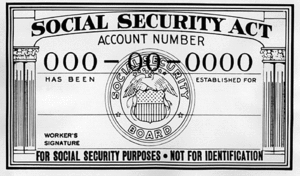No matter how careful you are about your own information, this particular screw up and many others like it colorfully illustrate how the mistakes of others can put us at risk. How far do you go to protect your data? Do you refuse to bank online? Keep cryptic passwords and change them regularly? Do you avoid social networking sites or posting any personally identifying information online? No matter how careful you are, you are not immune from information leakage and identity theft.
No one can remain completely isolated. Even if you avoid online services and have never so much as touched a computer (and we know that in this age that is a bit unlikely), you probably have a bank account somewhere, and that bank has your social security number and your other information stored, yes, on their computer systems. No bank? Your job, then. Have you ever been sick? Hospitalized? Yes, your data is stored everywhere. Your place of employment likewise has all of your information stored in their databases, and those computers are almost certainly connected to the World Wide Web.
Even living at home, off the grid (you have to give your information to the electrical company otherwise) and growing all of your own food, your information is still not perfectly secure. Even the Amish must pay property taxes, and the government has shown that even their databases are not perfectly secure, and that laptops can be stolen and accidents can happen. There is, quite simply, no way to control all of your own information.
So what can you do? Rather than aggressively trying to prevent your information from being used anywhere, you should be focused on vigilance. Watch your credit reports (see how), your credit card statements, and your bank accounts for any unfamiliar activity. This is not terribly difficult to do on your own, until hit with the reality of a true identity theft. The thing is, today you have the ability to lighten the burden, reduce the risk and impact of fraud, and the time it takes to recover from it, --if you do so before damage is done! Do yourself a favor, take control of your life --before someone else does. If you don't take action now -then when?
Your data may be "out there" in the world, stored in computers you know nothing about, but a little caution online can keep the casual scammers, phishers and thieves at bay. Remain vigilant, and try not to worry. No one is immune from identity theft, but that doesn't mean that you have cause to panic about it, either. Just become aware of the risks and the options you have to lessen the blow.

Image via Wikipedia
According to The Hill, the Federal Trade Commission (FTC) says businesses that rely on consumer accounts -- such as banks -- should have to meet higher standards to authenticate consumers' identity. They are calling upon Congress to "consider establishing national consumer authentication standards to verify that consumers are who they purport to be." They believe that tighter government restrictions that require more info than just a Social Security number when verifying an identity, would mitigate criminals' ability to steal people's identity when using that number alone.
Maneesha Mithal, an associate director at the FTC, told a Ways and Means subcommittee that thieves gather SSNs in a number of ways that range from high-tech, including "hacking, phishing, malware, spyware and keystroke loggers" to low-tech, such as "dumpster diving, stealing workplace records, stealing mail or wallets and accessing public records containing SSNs."
As criminals continue to find new and innovative ways at getting their hands on our data, we must be vigilant in finding ways to thwart them. This legislation would be a step in the right direction.


 NEWSLETTER SIGN UP
NEWSLETTER SIGN UP SUBSCRIBE
SUBSCRIBE CONTACT
CONTACT

















Leave a comment